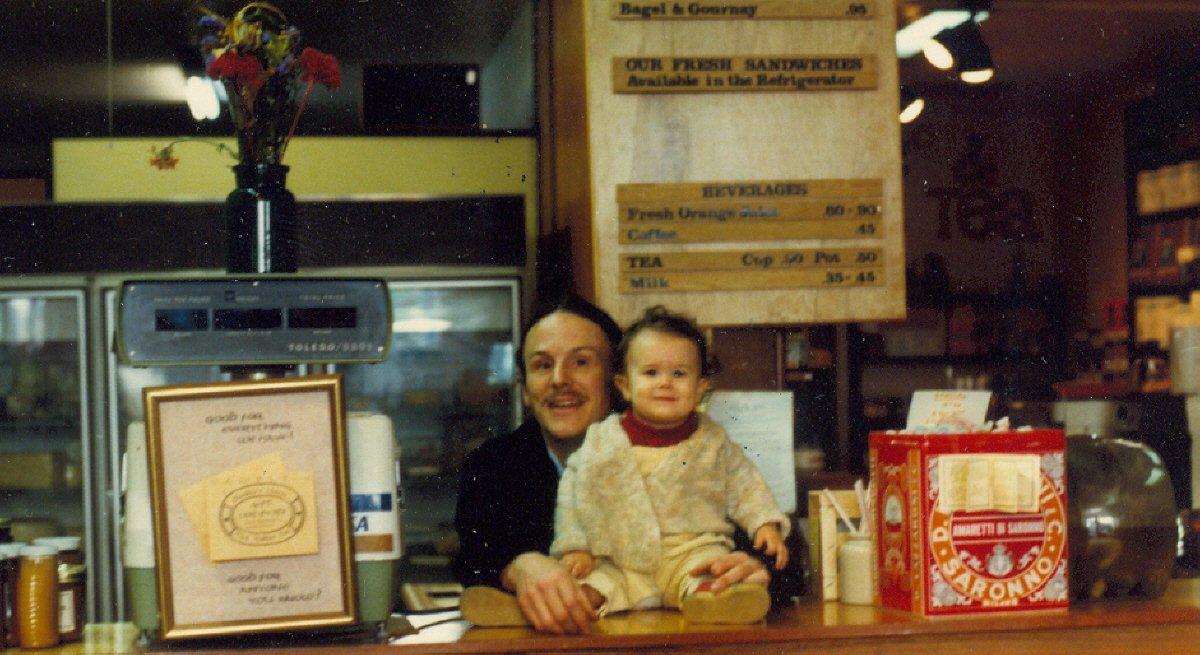The first business I owned in San Francisco was a retail food business. It was a crash course in how to launch a small business and what it takes to start a business partnership.

Behind the counter at Cheshire Cheese
Know your business partner
My business partner, Michael, and I were good friends before we ever thought to go into business together. We lived in a house with six other people and spent a lot of time in the kitchen. We enjoyed cooking big meals and feeding the rest of the house.
At the time, Michael co-owned a small manufacturing business. As we became friends, I volunteered to help in his business. It was soon clear that we had complementary work styles and had a similar approach to business management. We both saw small business as a vehicle to the principle of “right livelihood” and shared a collaborative approach to decision-making. It didn’t take long before we connected on a common business idea and decided to start a food retail business together.
Start with a good foundation
By the time we agreed to go into business together, we had a solid foundation for a business partnership. Michael had already started a business from scratch and had the technical and computer skills essential for smooth business operation. I had been to business school and had helped other friends start businesses. But what was most important was that:
- We liked and trusted each other,
- We knew we could work well together,
- We had complementary skills,
- We were both committed to working hard, planning ahead and taking on the risk, and
- We shared a passion… for gourmet food.
Agree on a viable business model
Our first idea was to start a catering business, making and delivering gourmet lunches to corporate offices. We thought we could use our home kitchen to keep it simple and lower costs. But we quickly learned that making food in a home kitchen wouldn’t be legal. It also couldn’t easily scale.
We then researched taking over an existing restaurant. We found a restaurant that we could acquire. We researched the legalities related to using the kitchen, building out the space, and hiring staff. But the size and complexity of the restaurant was going to require more capital than we had or could raise.
Given our skills, timeline and budget, we decided to compromise and start a gourmet deli.
Do the shoe leather research – street by street
We scouted several commercial strips in the city looking for a location with good foot traffic and reasonable rent. We pounded the pavement on Haight Street, Potrero Hill, West Portal, Noe Valley and Upper Fillmore. Finally, we found an available narrow storefront on Fillmore Street. It was an old laundromat available for sub-lease from the tenant next door, a tennis racket repair shop.
The space was the right price and we negotiated a fair lease. There was a hospital nearby and many new retailers moving into the neighborhood. But now we had another problem – competition! There was already an established deli right across the street. So we pivoted to focus on cheese. We signed the sub-lease and named our new gourmet cheese shop Cheshire Cheese. We were off and running!
Share the load
We spent the next six weeks building out the storefront. It was a community effort. While we focused on legalities and plans, we recruited friends to help with carpentry, plumbing, interior design and graphics. We figured out how to share responsibility for the business, each taking charge of certain aspects given our interests and skills.
Our partnership success
The success of our partnership and, I believe, any business partnership, was based on:
- A shared passion and common purpose
- Compatible personalities and work styles
- Complementary skill sets and areas of business expertise
- Good communication and joint decision-making, and
- A solid plan for how to market and manage the business… and make it work financially!
My partnership with Michael started with Cheshire Cheese and continued on into two other businesses. This hands-on business partnership experience continues to inform my consulting work today.
Owning a business with others can be an incredibly rewarding experience — but to work well it must be based on a solid foundation and good planning. Are you starting a business with others? Check out these three important steps when considering a business partnership or joint venture.
At Paul Terry & Associates we help both new and established business partners understand and assess what they each bring to the partnership and how they work together. We focus on partners’ expectations, strengths and weaknesses. We help define roles, address key issues and minimize areas of conflict. And then, we help create a written agreement and a plan for how to move forward together.
Leave a Reply